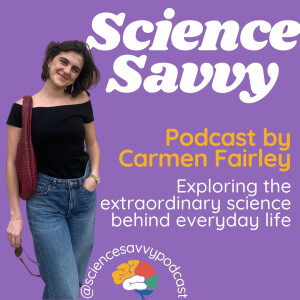
Tuesday Dec 24, 2024
Attention, Please: What ADHD Can Teach Us About the Brain
Welcome to the ADHD episode, part of Science Savvy with Carmen. In this episode, I explore what it really means to live with ADHD and how science is reshaping the way we understand it. With my background in pharmacology and biomedical engineering, I break down the science behind attention, dopamine, and neurodiversity, and unpack how it all shows up in everyday life.
This episode covers how neurotransmitters like dopamine and norepinephrine influence focus, what makes ADHD more of a difference than a deficit, and how modern life and social media interact with attention challenges. I’m joined by my brother Alex, who has ADHD, for a candid and personal conversation about medication, coping strategies, creativity, and hyperfocus. Whether you’re navigating ADHD yourself, supporting someone who is, or just curious about how attention works, this episode offers clear and engaging insights grounded in real research.
Science Savvy helps you understand the systems shaping your thoughts, health, and behavior. If you're ready to explore your body and brain with a little more clarity, you're in the right place.
Further reading and references:
Lee, Y. C., et al. (2022). Effects of mindfulness-based interventions in children and adolescents with ADHD: A systematic review and meta-analysis of randomized controlled trials. International Journal of Environmental Research and Public Health, 19(22), 15198. https://doi.org/10.3390/ijerph192215198
van der Oord, S., Bögels, S. M., & Peijnenburg, D. (2012). The effectiveness of mindfulness training for children with ADHD and mindful parenting for their parents. Journal of Child and Family Studies, 21(1), 139-147. https://doi.org/10.1007/s10826-011-9457-0
Arnsten, A. F. T. (2009). The emerging neurobiology of attention deficit hyperactivity disorder: The key role of the prefrontal association cortex. The Journal of Pediatrics, 154(5), I-S43. https://doi.org/10.1016/j.jpeds.2009.01.018
Volkow, N. D., & Swanson, J. M. (2013). Clinical practice: Adult attention deficit-hyperactivity disorder. The New England Journal of Medicine, 369(20), 1935-1944. https://doi.org/10.1056/NEJMcp1212625
Faraone, S. V., Biederman, J., & Mick, E. (2006). The age-dependent decline of attention deficit hyperactivity disorder: A meta-analysis of follow-up studies. Psychological Medicine, 36(2), 159-165. https://doi.org/10.1017/S003329170500471X
Swanson, J. M., & Volkow, N. D. (2002). Pharmacokinetic and pharmacodynamic properties of medications for ADHD: A review of stimulant and nonstimulant formulations. Molecular Psychiatry, 8(7), 252-264. https://doi.org/10.1038/sj.mp.4001326
Keng, S. L., Smoski, M. J., & Robins, C. J. (2011). Effects of mindfulness on psychological health: A review of empirical studies. Clinical Psychology Review, 31(6), 1041-1056. https://doi.org/10.1016/j.cpr.2011.04.006
Wiklund, J., Yu, W., Tucker, R., & Marino, L. D. (2017). ADHD, impulsivity, and entrepreneurship. Journal of Business Venturing, 32(6), 627-656. https://doi.org/10.1016/j.jbusvent.2017.07.002
White, H. A., & Shah, P. (2011). Creative style and achievement in adults with attention-deficit/hyperactivity disorder. Personality and Individual Differences, 50(5), 673-677. https://doi.org/10.1016/j.paid.2010.12.015
Armstrong, T. (2010). The Power of Neurodiversity: Unleashing the Advantages of Your Differently Wired Brain. Da Capo Press.
Ashinoff, B. K., & Abu-Akel, A. (2021). Hyperfocus: The forgotten frontier of attention. Psychological Research, 85, 1-19. https://doi.org/10.1007/s00426-020-01420-w
No comments yet. Be the first to say something!